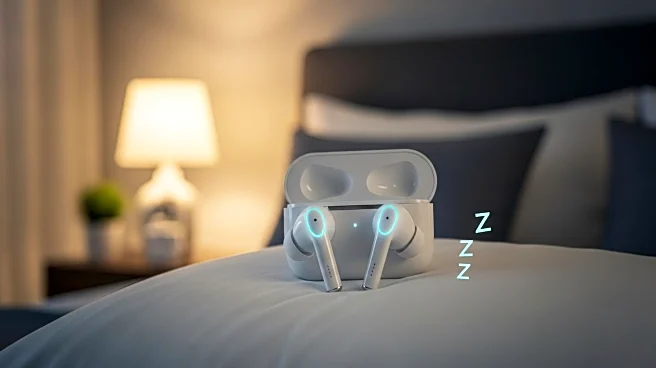What's Happening?
Anker has launched its latest Soundcore Sleep A30 sleep buds, designed to mask snoring through Active Noise Cancellation (ANC). These earbuds feature a microphone within the charging case that adjusts masking audio to effectively cancel out snoring sounds. The A30 buds are smaller than their predecessors, making them more comfortable for side sleepers. They offer up to 9 hours of battery life per charge with ANC enabled, extending to 45 hours with the charging case. However, streaming audio over Bluetooth reduces battery life to approximately 6.5 hours. The buds also include a sleep tracking feature, although its accuracy has been questioned. Additionally, the buds can play various white noise and soundscapes to aid sleep, and they now include a microphone for making calls.
Why It's Important?
The introduction of Anker's Soundcore Sleep A30 buds addresses a common issue faced by many individuals: disrupted sleep due to snoring. By providing a solution that combines comfort and technology, Anker is tapping into the growing market for sleep aids and wellness products. The ability to mask snoring can significantly improve sleep quality for users and their partners, potentially reducing sleep-related health issues. The product's focus on comfort for side sleepers and its integration of sleep tracking features reflect a broader trend in consumer electronics towards personalized health and wellness solutions.
What's Next?
As Anker continues to innovate in the sleep technology space, the company may explore further enhancements to its sleep buds, such as improved battery life and more accurate sleep tracking. The market response to the A30 buds will likely influence future product developments. Additionally, Anker's competitors may introduce similar products, leading to increased competition and innovation in the sleep aid industry. Consumer feedback will be crucial in shaping the next generation of sleep technology products.
Beyond the Headlines
The development of sleep buds like Anker's A30 raises questions about the intersection of technology and personal health. As more devices aim to improve sleep quality, ethical considerations regarding data privacy and the accuracy of health-related features become increasingly important. Furthermore, the reliance on technology for sleep may shift cultural attitudes towards traditional sleep practices and remedies.










